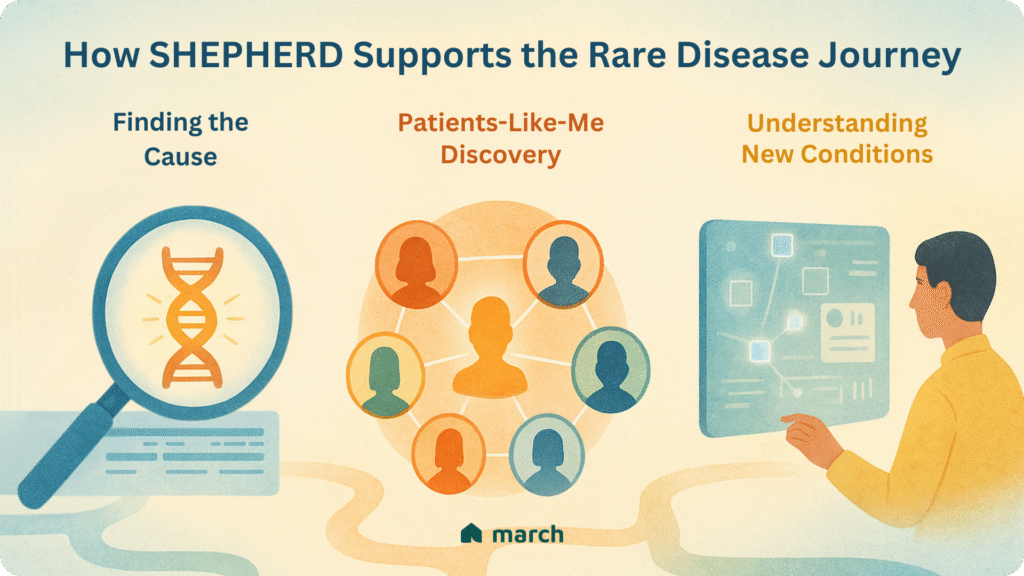Finding Faster Answers For Rare Diseases with SHEPHERD AI
The path to diagnosis can often feel long and like Homer’s odyssey, filled with questions and uncertainties. But we want you to know you are not alone.
Today, we’re excited to share insights into a remarkable stride forward: SHEPHERD. This innovative artificial intelligence (AI) framework is designed to help rare disease patients find answers more quickly and accurately for rare diseases.
A Guiding Light in the Search for Answers
Imagine an AI system that can learn about a rare disease even when there are very few patient examples in the world. That’s exactly what SHEPHERD does. It’s a new kind of deep learning that doesn’t need thousands of diagnosed patients to understand a condition. Instead, it learns by exploring a vast map of existing biomedical knowledge. It learns effectively from simulated patient data. This is a clever way to overcome the challenge of data scarcity while protecting patient privacy.
SHEPHERD isn’t just about giving a single answer; it’s designed to help in many ways throughout the diagnostic journey:
- Finding the Cause: It helps identify the specific causal gene behind a patient’s condition, making the search for answers much faster.
- Patients-Like-Me Discovery: It can find other patients with similar genetic or clinical features. This helps connect families and inform doctors by showing comparable cases.
- Understanding New Conditions: For conditions that have never been seen before, SHEPHERD can provide descriptive insights. These insights guide researchers and clinicians in their investigations.

Real-World Steps Forward with SHEPHERD AI
SHEPHERD has been put to the test with real patient information from places like the Undiagnosed Diseases Network (UDN). The UDN is a group dedicated to solving the most challenging rare disease cases. Even when a disease or gene was seen in only one patient, SHEPHERD showed its strength. It accurately pinpointed the correct causal gene for many (ranking it as the top prediction for 40% of UDN patients). It often ranked it among the top predictions. This means less time searching and more time moving towards understanding and care. This impressive performance highlights its generalizability across diverse patient groups and clinical settings.
Our Shared Path to Hope
While AI like SHEPHERD offers incredible potential, we know it’s a tool that works best when it supports our dedicated healthcare professionals. It helps them piece together complex puzzles that are often too vast for human experience alone. Thus, speeding up the diagnostic journey that can otherwise span years.
We are excited about these advancements because they mean more families can move forward from the uncertainty of an undiagnosed condition. The journey may be complex, but with innovations like SHEPHERD and our strong, supportive community, we are truly not alone.
Want to know more about SHEPHERD AI? Our latest podcast episode explores the topic in depth.
Sources
- medRxiv. Main Research Paper (Preprint): The foundational research paper describing the SHEPHERD framework, its methodology, and results: https://www.medrxiv.org/content/10.1101/2022.12.07.22283238v1
- npj Digital Medicine. Published Article: The peer-reviewed, published version of the research: https://www.nature.com/articles/s41746-025-01749-1
- Zitnik Lab at Harvard. SHEPHERD Project Page: The official project page which provides an overview and links to all related resources: https://zitniklab.hms.harvard.edu/projects/SHEPHERD/
- GitHub. GitHub Repository: The publicly available source code for the SHEPHERD model: https://github.com/mims-harvard/SHEPHERD
- Hugging Face. Interactive Demo: A web-based tool to explore SHEPHERD’s predictions: https://huggingface.co/spaces/emilyalsentzer/SHEPHERD
- Harvard Dataverse. SHEPHERD Datasets: The repository for the rare disease knowledge graph and simulated patient data used to train SHEPHERD: https://dataverse.harvard.edu/dataset.xhtml?persistentId=doi:10.7910/DVN/TZTPFL
- ResearchGate. (PDF) AI in Rare Disease Diagnosis: Solving the Puzzle of Complex Cases: https://www.researchgate.net/publication/387795119_AI_in_Rare_Disease_Diagnosis_Solving_the_Puzzle_of_Complex_Cases
